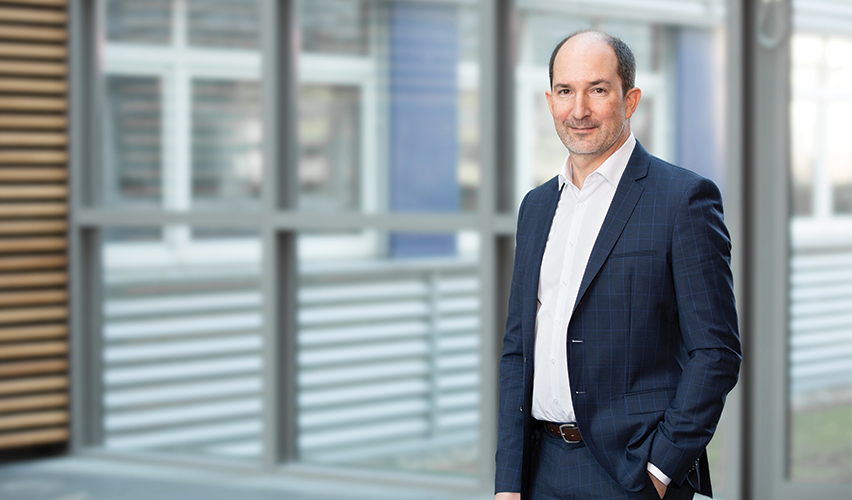The boomerang effect: How a series of life events came full circle.

Location: Hamburg, Germany
When Andrew Muirhead (TC 1988) was five years old, his grandfather gave him a model aircraft for Christmas – a Lufthansa Airbus A300. The gift wasn’t symbolic in any way; it was simply a fitting present for a young boy.
The model was eventually tucked away, as childhood gifts often are, and Andrew went on to study electronics engineering at university with a secondary course in German – the latter because his degree required an arts subject and he didn’t like the look of anything else.
Little did Andrew realise that his course combination would lead him to Lufthansa in Hamburg, where his first project involved working with the Airbus A300 fleet.
‘I remember looking through photographs from my childhood one day and there was one of my grandfather giving me that A300. I thought to myself, how weird is that?’
Although serendipitous, Andrew’s route to Germany wasn’t so straightforward. With the encouragement of his German professor, he had applied for two internships in Germany, however Airbus didn’t respond and Lufthansa rejected him.
‘Luckily, Lufthansa told me in their rejection letter that the reason I wasn’t accepted was because I didn’t have the right subjects,’ says Andrew. ‘So, the next day, I went to the university and changed my subjects, then wrote back to tell them. Four months later I had a business class ticket to Hamburg in my Trinity pigeonhole and an invitation to join their internship program. As you can imagine, I was speechless.’
When Andrew arrived in Hamburg, he was told his application stood out as nobody had ever applied from so far away. Then when Andrew had reapplied, his persistence was noted, so the management decided to give him a shot. Andrew’s boss during his internship ultimately became the CEO of Lufthansa Technik, the aircraft industry’s largest independent provider of maintenance, repair and overhaul services, and with that, Andrew had a shoo-in for a future career.
Andrew started his career in consulting, after applying for a job with Andersen Consulting (now Accenture) in Hamburg on a whim during a trip around Europe. He soon tired of the hectic lifestyle, and in 1996, found himself back in the Lufthansa Group after securing an avionics engineering role in Lufthansa Technik’s engineering division.
‘By 2001 I was getting frustrated installing equipment onto aircraft from suppliers and said to a colleague, “I think we could build better systems than this”, and he said, well why don’t we?’ recalls Andrew.
Andrew’s subsequent business plan to start a manufacturing unit landed on the desk of the CEO. The CEO remembered Andrew’s tenacity as an intern and gave him the money to build a startup within the company, which began life in a small leaky office and went on to be known as the Original Equipment Innovation product division. ‘Everyone talks about startups these days, but back then, it was a pretty bold move for a large company to do something like that,’ says Andrew.
Given the startup culture’s infancy, brainstorming beanbags weren’t quite a thing yet either. ‘I decided I wanted to replace some of the tables and chairs with beanbags so people would be more relaxed,’ says Andrew. ‘I ordered the beanbags, then got a call from the purchasing department who said they were non-standard meeting room furniture and the system wouldn’t accept them. I said they should look under the definition of brainstorming room, only to be told there was none. So, I said they needed to add brainstorming room to the system and add beanbags as a furniture option.’
Beanbag brainstorming sessions turned out to be critical to the business, with some of Andrew’s challenges including the development of a patent for a power socket to ensure safe charging of laptops on board, and the creation of thin wooden veneer surfaces that light up with a motion-activated control panel. ‘They are fun projects, because the customer comes in with these ideas and then we as engineers need to sit down and figure out how to implement them.’
German engineering helps the process, which Andrew says isn’t a myth. ‘They really go into great detail to make sure everything works perfectly.’ That said, fitting perfection within a budget can sometimes be difficult, and Andrew feels that’s where some Australian pragmatics and good leadership can come in handy. ‘I think Trinity gave me a pretty good all-rounder view of the world and also helped me develop leadership and time management skills, even just by leading bush walks and trying to fit a college musical in around study. At the time it was just a bit of fun and I didn’t think much of its impact, but looking back, it was really quite something. The whole Trinity experience – living with a whole bunch of different people and doing so many different things is something I would not want to have missed for anything – it was probably the most formative part of my life.’
Given Andrew’s positive experience with both Trinity and a life-changing internship, he has just awarded internships to two Trinity students to join him in Hamburg.
While they’ll be a long way from home, the interns’ office will have a subtle connection to Australia. Once Andrew’s business unit took off (it now employs more than 350 staff and turns over A$100 million in revenue), the board agreed to construct a purpose-built building for the business and the architect thought it fitting to let everyone leave their signature on the building. When approached, Andrew asked if they could build it in the shape of a boomerang. So they did.
Now, if you fly over Hamburg, you can not only see a symbol of Australia, but also a symbol of Andrew’s career, as he’s proven that what goes around comes around. And sometimes that can be a good thing.
